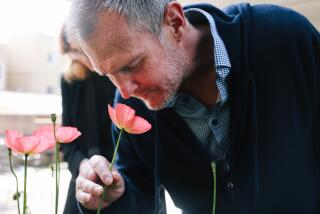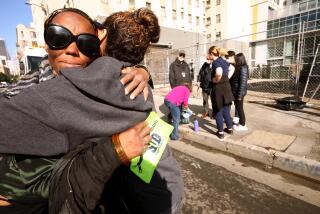Helping Hospital Patients Is Goal of Student Who’s Been There
- Share via
Julie Inman lives almost constantly with a mental picture of herself skiing down a Colorado slope.
It goes away only occasionally, on gentle spring evenings when she feels like getting up to go for a jog. But then it rushes back: She hasn’t been able to run for seven years, not since New Year’s Day, 1981, when she blacked out while skiing because of a brain hemorrhage.
She was 15, an active sports fan, camp counselor and soccer coach living with her parents, Peter and Patty Inman, in Irvine when the undetected, congenital problem turned her into a limp, mute “rag doll.”
Friends and neighbors rallied to support her. And at 19, she already had impressed doctors, teachers, friends and classmates with her spectacular recovery. The damage to her brain, similar to that of a stroke, affected her ability to control her muscles but not her ability to think, said her therapist, Gail Smith of Los Angeles.
“She’s come farther than doctors ever thought she would,” Smith said. “She’s very motivated and really pushes herself. She wants to be like everybody else.”
At first, Inman saw in images of eight. It was four weeks before she could speak. It took her six months to sit up by herself and eight months to walk with help. Her speech and handwriting still shaky, she attended high school classes and graduated from Mater Dei High School in Santa Ana.
Now 22, Inman is a senior English major at the University of Southern California with a near-3.0 grade average. She belongs to her mother’s sorority, Kappa Kappa Gamma, and can walk upstairs to the second floor of the sorority house where she lives.
Last September, she rolled over to the Los Angeles Memorial Coliseum by herself and sneaked in to see the Pope. A friendly policeman--”I think he must have been a Catholic,” she said--helped her to a field level view and walked her home at night.
By pushing herself several hours a day to walk, exercise and ride a stationary bicycle, Inman now is able to walk half a mile in 36 minutes--with the aide of two canes. Mainly, though, she uses her battery-powered wheelchair because her walking speed is still slow, she said.
She shakes less and her balance has improved, as has her speech. “I’ve practically got that licked because I talk a lot,” she said, laughing on a recent sunny afternoon at the USC campus.
Her main aim is to help others.
Last summer, she volunteered at an Irvine retirement home, directing bingo games and reading activities. A highlight of her recovery was giving three speeches there on “positive attitude.”
“I reinforce how important it is to be thankful for what you have, it can be lost so easily; how important it is to have support, especially from family and neighbors, and I stress the importance of religion and prayers. God wanted me to continue living for a reason,” Inman said. She said she believes that reason is to become a counselor.
When she graduates this year, Inman wants to tutor, then get a master’s degree in counseling. Eventually, she hopes to counsel hospital patients like she once was. “I think I’m real good at understanding why people feel the way they do,” she said.
At first, Inman said she deplored others’ “pitying looks.” Now, people “treat me like anyone else,” something she both likes and dislikes.
“Most don’t ask why I’m in a wheelchair. I love that. (Yet) sometimes I get mad when they act like there’s nothing wrong with me. I get impatient when they don’t offer to carry my books upstairs. But if they did, I’d be hurt,” she conceded. “You can’t have everything, I guess.”
Sometimes, Inman feels lonely, depressed and frustrated. It takes so long to read, study, write and move. And she feels guilty having to ask people for rides. Learning to drive is high on her to-do list, but so far, she said, her reflexes are not fast enough.
She attends fewer sorority dances now than in her first two years. And she doesn’t date--probably, she said, because she is “scared.” Besides, she said, she finds most USC men “over-confident” and “not gentlemanly.”
And in the back of her mind, she said she constantly wonders what might have been had she been able to continue skiing down that slope. But she prefers to focus on her accomplishments, not her limitations.
Last year, she wrote a term paper on the effects of trauma to the cerebellum for a neuroscience class. “I felt bad--like using my handicap to get ahead. But I figure you’ve given a lot, why not take a little?”
She got an A.
More to Read
Sign up for Essential California
The most important California stories and recommendations in your inbox every morning.
You may occasionally receive promotional content from the Los Angeles Times.













